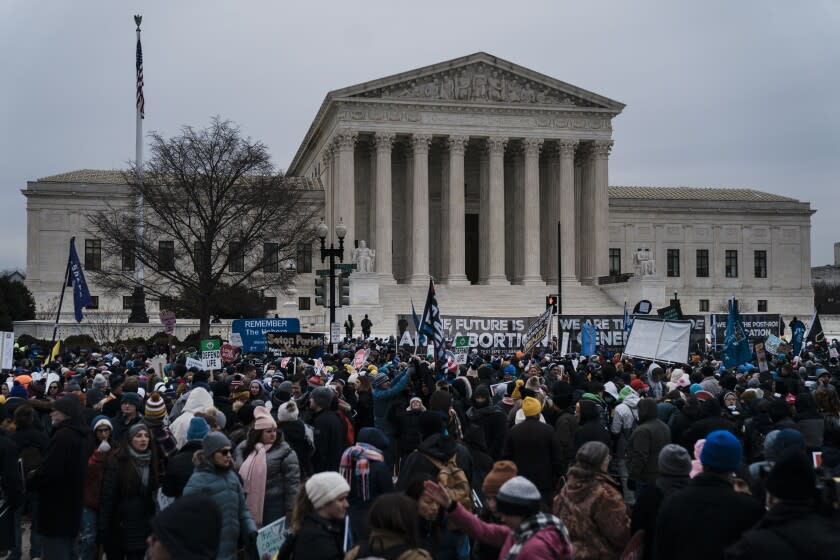Abcarian: This is a perilous moment for rights we take for granted

- Oops!Something went wrong.Please try again later.
- Oops!Something went wrong.Please try again later.
Last week, I got an earful from readers who were angry that I defended peaceful protests at the homes of three conservative Supreme Court justices, who with their conservative brethren, appear to be on the verge of overturning Roe vs. Wade.
Some said I might feel different if protesters had invaded my neighborhood and disrupted my peace. A couple of them suggested maybe they would take it upon themselves to do just that. A man with a deep twang and a Texas phone number left a voicemail urging me to “pull your head out of your duffle bag,” then signed off sarcastically with “have a wonderful night, and I may see ya soon.”
I’d wager most columnists receive feedback like that. People get angry and spout off.
I worry more about dishonest elected officials who'd rather whip up faux outrage than protect free speech. Like the ones who called the pro-abortion rights marchers “disgusting” and accused the Department of Justice of allowing “mob rule.” Sen. Chuck Grassley (R-Iowa) said the protests were “plainly efforts to bully the court.” As if.
Then-White House Press Secretary Jen Psaki defended the peaceful protests, a move that seems to have prompted the reliably nutty Republican U.S. Rep. Jim Jordan of Ohio to write the White House demanding to know about its “role in and awareness of the inappropriate and potentially illegal left-wing intimidation and harassment campaign directed at Supreme Court justices.”
U.S. Rep. Elise Stefanik (R-N.Y.), a charter member of the Big Lie caucus, said with a straight face that “what makes Republicans consistent is we speak out against violent acts no matter who commits them.”
And of course, everyone then began yammering about a stupendously broad 1950 federal law that bans “pickets or parades” in or near court buildings or the homes of judges, jurors, witnesses or court officers if the intent is to obstruct or impede the court’s work or to influence judges, jurors or witnesses.
Presumably, then, the March for Life that abortion foes lead each year at the Supreme Court would be an illegal act by an unruly mob of thugs, as would any protest for any reason on the iconic court steps.
"Applying this law to this situation raises that fuzzy line between speech or demonstrations that are really meant to intimidate or subvert a judicial process in a substantive way," Drexel University law professor Tabatha Abu El-Haj told CNN. "It's true that this could arguably subvert the judicial process if the opinion changed, but it seems really that the point of it is more to express frustration."
When you have a Supreme Court whose ultra-conservative majority was created by Republican political shenanigans following the election of a Republican president who lost the popular vote, how is it offensive that people who support legal abortion — between 61% and 80% of Americans, depending on the poll — exercise their right to free speech by showing up in person to peacefully register their outrage?
A real threat to a Supreme Court justice — or any judge for that matter — should result in a criminal prosecution. But that’s not what’s happening here.
As a child, I recall driving from Florida to California with my family and asking my parents to explain the “Impeach Earl Warren” billboards we saw. They were part of a quixotic campaign led by the John Birch Society, an ultra-right-wing group dedicated to rooting out communism, especially of the imaginary kind, and maintaining racial segregation. (In our house, to be called a “Bircher” was a terrible insult.)
For Birchers, Supreme Court Chief Justice Warren’s great sin was writing the 1954 opinion in the landmark case Brown vs. Board of Education, which outlawed racial segregation by overturning Plessy vs. Ferguson, the 1896 case that had enshrined in law the doctrine of “separate but equal.”
As California governor in the late 1940s, Warren had outlawed school segregation of any kind in the state, motivated by court cases brought by Mexican American families against school districts in San Diego and Orange counties, where their children were forced to attend “Mexican schools.”
The Brown decision, which followed the California cases, was a hugely important moment in American history. The justices were unanimous, it undid a terrible wrong and it had a profoundly positive impact on American life by reversing decades of institutionalized discrimination.
Naturally, that drove the racists crazy.
In his biography of Earl Warren, “Justice for All,” my former colleague Jim Newton wrote that near Montecito, someone hung a bedsheet proclaiming “that America had fallen under the cruel dictatorship of ‘Communist Warren’ and that ‘If we do not kill him, he will enslave all of us.’”
What a rich use of the verb “enslave.”
The Brown decision, after all, was an expansion of rights for Black Americans and other people of color. That is the exact opposite of what is happening now, with a court that appears all too willing to rip a constitutional right away from half the population, force people to bear children against their will and turn back the clock on gender equality.
Not only that, but overturning Roe will almost certainly lead to efforts in red states to reverse all sorts of rights Americans now take for granted.
Just wait until states start jailing people for having miscarriages or crossing state lines to obtain abortions. Or until newly empowered legislatures decide to reverse freedoms we have long taken for granted — such as the right to use contraception, marry a person of a different race or marry a person of the same sex.
The low-key protests in front of justices’ homes will pale in comparison to the demonstrations we are bound to see if lawmakers and judges try to bully their way back into American bedrooms.
It will not be pretty.
This story originally appeared in Los Angeles Times.

